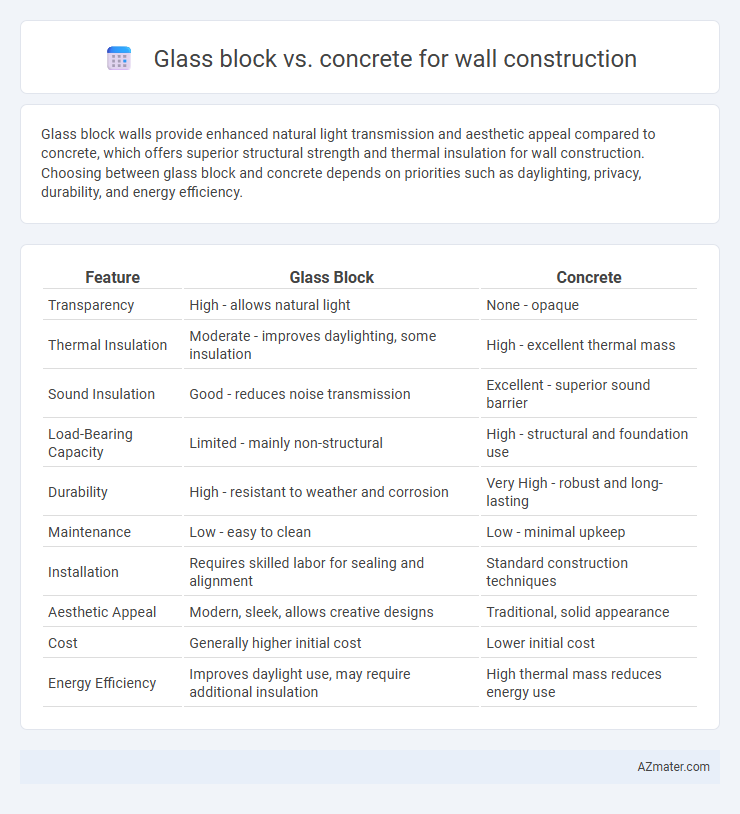Glass block walls provide enhanced natural light transmission and aesthetic appeal compared to concrete, which offers superior structural strength and thermal insulation for wall construction. Choosing between glass block and concrete depends on priorities such as daylighting, privacy, durability, and energy efficiency.
Table of Comparison
| Feature | Glass Block | Concrete |
|---|---|---|
| Transparency | High - allows natural light | None - opaque |
| Thermal Insulation | Moderate - improves daylighting, some insulation | High - excellent thermal mass |
| Sound Insulation | Good - reduces noise transmission | Excellent - superior sound barrier |
| Load-Bearing Capacity | Limited - mainly non-structural | High - structural and foundation use |
| Durability | High - resistant to weather and corrosion | Very High - robust and long-lasting |
| Maintenance | Low - easy to clean | Low - minimal upkeep |
| Installation | Requires skilled labor for sealing and alignment | Standard construction techniques |
| Aesthetic Appeal | Modern, sleek, allows creative designs | Traditional, solid appearance |
| Cost | Generally higher initial cost | Lower initial cost |
| Energy Efficiency | Improves daylight use, may require additional insulation | High thermal mass reduces energy use |
Introduction to Wall Construction Materials
Glass blocks provide natural light and aesthetic appeal while offering moderate insulation and privacy, making them ideal for decorative or partition walls. Concrete walls deliver exceptional strength, durability, and thermal mass, suitable for load-bearing structures and soundproofing. Selecting between glass block and concrete depends on factors like structural requirements, insulation needs, and design preferences in wall construction.
Overview of Glass Block Walls
Glass block walls provide a unique blend of natural light transmission and privacy, making them ideal for both interior and exterior applications. Their translucent properties offer thermal insulation and soundproofing advantages compared to traditional concrete walls. While concrete walls provide structural strength and durability, glass block walls enhance aesthetic appeal and create visually striking partitions without sacrificing security.
Overview of Concrete Walls
Concrete walls offer exceptional strength, durability, and thermal mass, making them ideal for structural and foundational applications in construction. They provide excellent fire resistance, sound insulation, and energy efficiency due to their dense composition and ability to retain heat. Compared to glass blocks, concrete walls are more cost-effective for load-bearing structures and offer greater versatility in design, including the ability to be reinforced with steel for enhanced strength.
Aesthetic Appeal: Glass Block vs Concrete
Glass blocks offer a unique aesthetic appeal characterized by translucency and light diffusion, creating visually striking walls that enhance natural lighting and add a modern touch to interiors. Concrete walls provide a solid, industrial look with customizable textures and finishes, appealing to minimalist and contemporary design preferences. Choosing between glass block and concrete depends on the desired balance between light permeability and structural solidity in architectural projects.
Structural Strength and Durability Comparison
Glass blocks offer moderate structural strength ideal for non-load-bearing walls while providing excellent natural light diffusion; however, they are less impact-resistant than concrete. Concrete walls exhibit superior compressive strength, durability, and resistance to environmental stressors, making them preferred for load-bearing and exterior applications. The choice depends on balancing aesthetic benefits of glass blocks with the robust, long-lasting performance of concrete in structural requirements.
Thermal and Sound Insulation Properties
Glass blocks provide excellent natural light transmission while offering moderate thermal insulation with a typical R-value between 1.1 and 1.5, making them less efficient than concrete walls insulated with materials achieving R-values of 10 or higher. Concrete walls, especially when paired with insulation layers, deliver superior soundproofing and thermal resistance, reducing heat transfer and noise significantly in comparison to hollow glass blocks. For projects prioritizing energy efficiency and acoustic privacy, concrete walls with added insulation outperform glass blocks in maintaining stable indoor temperatures and minimizing external noise infiltration.
Light Transmission and Privacy Factors
Glass block walls offer superior light transmission, allowing natural daylight to permeate spaces while maintaining a high level of privacy due to their translucent properties. Concrete walls provide excellent privacy and sound insulation but significantly reduce light transmission, resulting in darker interiors. For projects prioritizing daylight infiltration without sacrificing privacy, glass blocks present an optimal solution compared to the opaque and dense nature of concrete.
Installation Process and Complexity
The installation process for glass block walls involves precise alignment of individual units with mortar or silicone joints, requiring skilled labor and careful handling to avoid damage, which makes it more time-consuming and complex compared to concrete wall construction. Concrete walls are typically formed using reusable molds or formwork, allowing for faster pouring and curing with less precision needed during installation, streamlining the overall construction process. The complexity of glass block installation lies in achieving uniform joint spacing and ensuring structural integrity, whereas concrete walls demand expertise in formwork setup and proper curing techniques to prevent cracking.
Cost Comparison: Glass Block vs Concrete
Glass blocks typically cost between $15 and $30 per square foot, making them more expensive than concrete, which ranges from $6 to $12 per square foot for standard wall construction. While glass blocks offer aesthetic appeal and natural light diffusion, concrete provides superior structural strength at a lower price point. Maintenance costs for glass blocks tend to be higher due to potential sealing and cleaning needs, whereas concrete walls require minimal upkeep, affecting overall lifetime expenses.
Best Applications for Each Material
Glass blocks excel in applications requiring natural light diffusion and aesthetic appeal, such as interior partition walls, bathroom enclosures, and decorative facades. Concrete is ideal for load-bearing walls, foundation structures, and exterior walls due to its superior strength, durability, and insulation properties. Selecting between glass block and concrete depends on factors like structural requirements, light transmission needs, and design preferences in wall construction projects.

Infographic: Glass block vs Concrete for Wall construction
 azmater.com
azmater.com